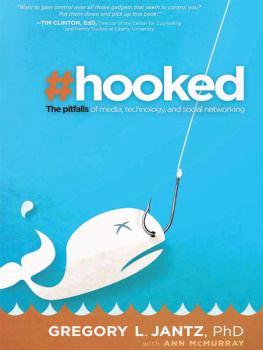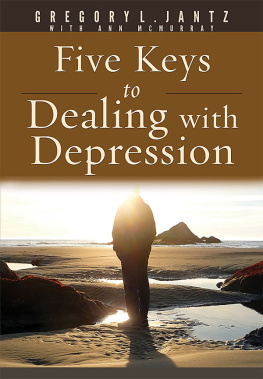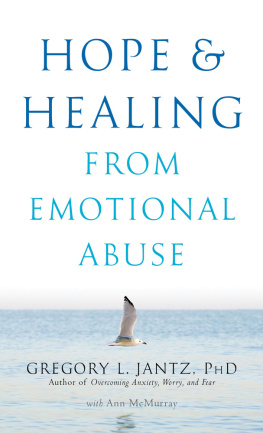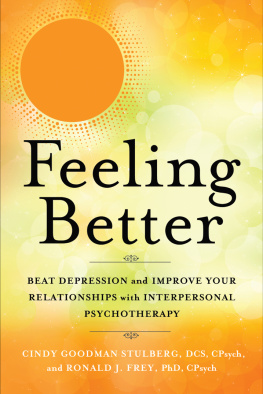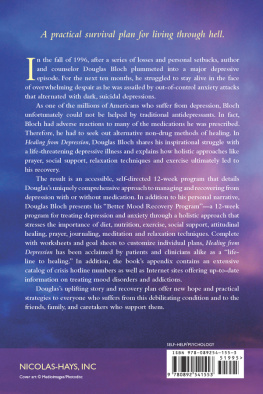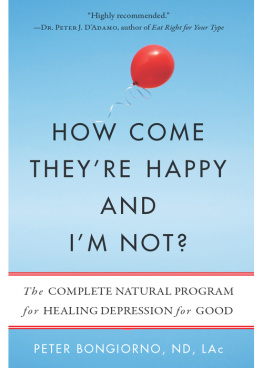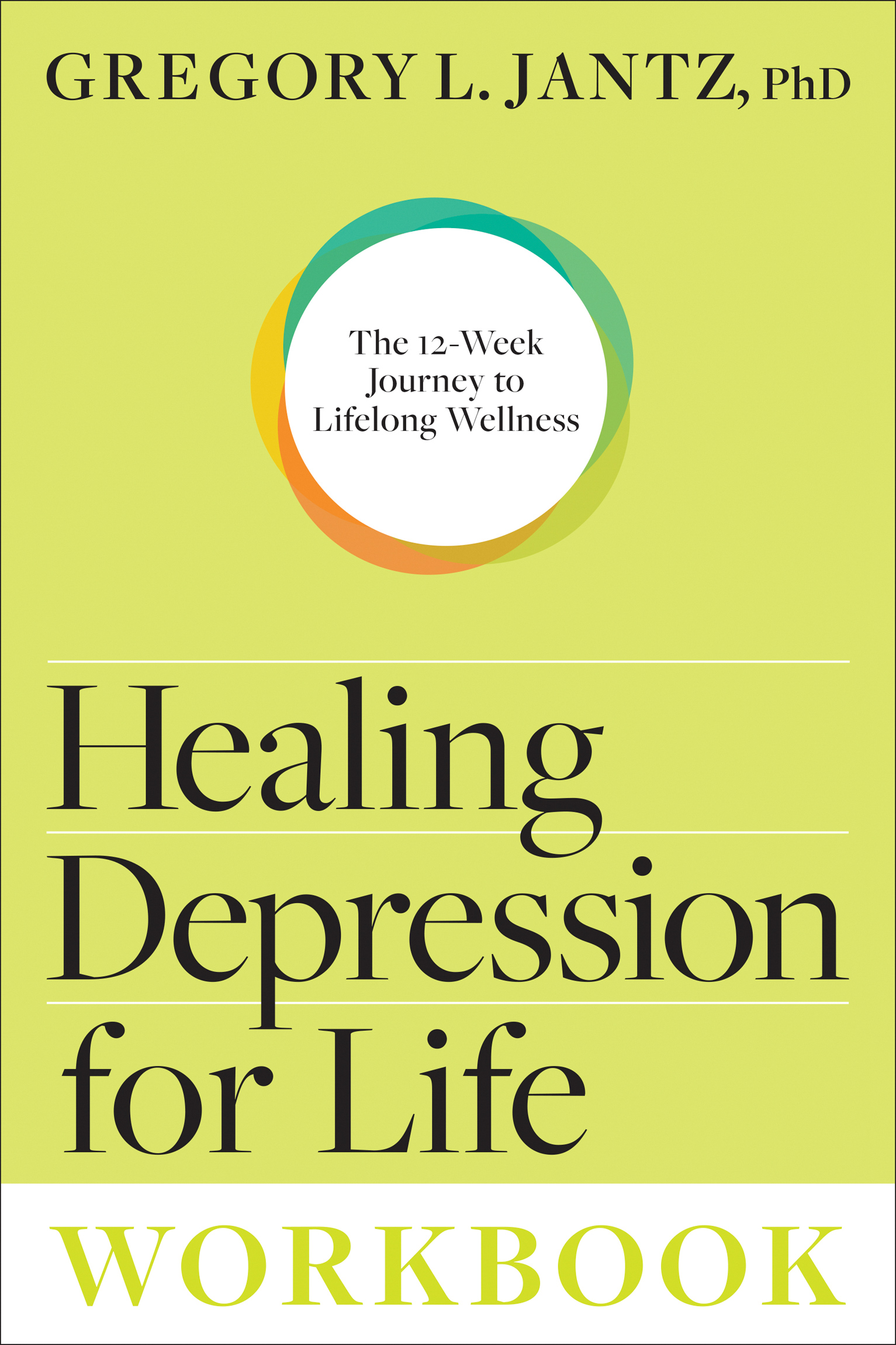Visit Tyndale online at www.tyndale.com.
Visit Tyndale Momentum online at www.tyndalemomentum.com.
TYNDALE, Tyndale Momentum, and Tyndales quill logo are registered trademarks of Tyndale House Publishers, Inc. The Tyndale Momentum logo is a trademark of Tyndale House Publishers, Inc. Tyndale Momentum is the nonfiction imprint of Tyndale House Publishers, Inc., Carol Stream, Illinois.
Healing Depression for Life Workbook: The 12-Week Journey to Lifelong Wellness
Copyright 2019 by Dr. Gregory Jantz. All rights reserved.
Cover illustration by Jennifer Phelps. Copyright Tyndale House Publishers, Inc. All rights reserved.
Designed by Jennifer Phelps
Edited by Jonathan Schindler
Published in association with The Bindery Agency, www.TheBinderyAgency.com.
All Scripture quotations, unless otherwise indicated, are taken from the Holy Bible, New International Version, NIV. Copyright 1973, 1978, 1984, 2011 by Biblica, Inc. Used by permission. All rights reserved worldwide.
Scripture quotations marked ESV are from the ESV Bible (The Holy Bible, English Standard Version), copyright 2001 by Crossway, a publishing ministry of Good News Publishers. Used by permission. All rights reserved.
Scripture quotations marked NLT are taken from the Holy Bible, New Living Translation, copyright 1996, 2004, 2015 by Tyndale House Foundation. Used by permission of Tyndale House Publishers, Inc., Carol Stream, Illinois 60188. All rights reserved.
For information about special discounts for bulk purchases, please contact Tyndale House Publishers at , or call 1-800-323-9400.
ISBN 978-1-4964-3769-3
Build: 2019-06-21 10:29:07 EPUB 3.0
INTRODUCTION : Building Your Success Plan
The good life is waiting for you. Right now. Right here.
Deep-down contentment and genuine happiness are available to you. Not someday, but soon.
Its fully possible to find healing for your depression. For life.
Even in our furiously fast-paced and worrisome world, you can live a more peaceful, purposeful, and productive life. You can be free from thoughts, feelings, and habits that drag you down rather than lift you up. You can learn to draw the life-numbing poison out of your past pain, present problems, and future fear.
This good life doesnt lie at some distant destination or at the end of year after year of seeking. It is yours for the takingstarting now. The only cost of admission is your willingness to change the way you see yourself and the world around you... and to consistently incorporate the healthy habits that will bring lasting wholeness. The payoffa life infused with beauty, joy, and meaningis well worth the investment.
I am not giving you a pep talk or offering snappy slogans to help you feel better temporarily. The last thing you need is advice that rings hollow or bromides that promise much and deliver little. If youve been battling depression for any length of time, you have likely heard all kinds of recommendations that didnt bring you much improvement. Worse, youve probably heard plenty of clichs from well-meaning (but unhelpful) people: Hang in therethis too shall pass or Keep looking up or Hold on to your faith.
I know that overcoming depression takes patience, dogged determination, the courage to confront painful issues, openness to new ideas, and a commitment to change long-standing patterns of behavior.
Another essential element is needed to heal depression: hope.
In three decades as a mental health expert, I have counseled thousands of people who needed help coping with pain and fear of every kind: depression, guilt, anger, anxiety, addiction, and the emotional scars of physical and psychological abuse. Early in my career, I was often dismayed by the epic scope of battles people waged within themselves and the elusive struggle to achieve true healing. It seemed to me that lasting wellness was a treasure many seek but few ever find.
Then I realized something vitally important. Many of the hurting people I counseled were eageror desperateto overcome their troubles but lacked the key ingredient of hope. By the time these people began therapy with me or sought treatment at the clinic I direct, they had lived with their condition for so long and tried so many unfruitful treatment options that optimism had all but vanished. Distress and depression, usually caused by a variety of factors, were compounded by a fundamental lack of hopefulness and confidence that anything would ever change.
This led me to make hope a cornerstone of all the therapy, speaking, writing, research, and treatment planning I do. In 1996, we changed the name of our Seattle-area treatment facility after clients said, This is a place of hope. Thats exactly what we wanted it to be, and the name stuck. Our facility is now called The Center: A Place of Hope. My team and I also adopted Jeremiah 29:11-14 as our clinics guiding Scripture passage:
I know the plans I have for you, declares the L ORD , plans to prosper you and not to harm you, plans to give you hope and a future. Then you will call on me and come and pray to me, and I will listen to you. You will seek me and find me when you seek me with all your heart. I will be found by you, declares the L ORD , and will bring you back from captivity.
I encourage you to reflect on these life-changing words and embrace them as your touchstone as you pursue emotional, spiritual, and physical wellness. After all, depressed people often feel that they are in captivity of sortstrapped and immobilized by a force bigger than themselves. But God will indeed bring you back. Depressed people often do not feel enthused about the future, if they can envision one at all. But God will help you renew your dreams and refresh your energy to achieve them.
As foundational as hope is to true healing, there are many other crucial steps to take on the journey. And these steps form the twelve weeks of exercises, assessments, and reflections in the pages ahead. In addition to the need for hope, I realized something else many years ago: most approaches to depression focus on one particular method or technique to address a complex mental health conundrum. Thats what has become common for the treatment of depression these days. Care providers tend to use their favorites as singular fixes to a disorder that is never caused by one thing alone. Most frequently, this means taking antidepressant medication, seeing a counselor for talk therapy, starting a specialized diet regimen, or participating in cognitive behavioral therapy.
While each of these individual approaches can be helpful and sometimes needed, I believe that lasting healing occurs through a whole-person, multifaceted approach. In my experience, depression always arises from multiple factors converging from lots of different directions in a persons life. Treating one thing at a time, with one method at a time, may move you toward healing but will usually fall short of complete healing. This is why my whole-person approach addresses the following:
- achieving ample, restorative sleep
- examining the use of technology and making sure it is not contributing to depression
- minimizing and managing stress
- uncovering hidden addictions
- resolving the three deadly emotions: anger, guilt, and fear
- working through the process of forgiveness for hurts and heartaches
- engaging in soul care and spiritual practices
- participating in consistent physical activity


